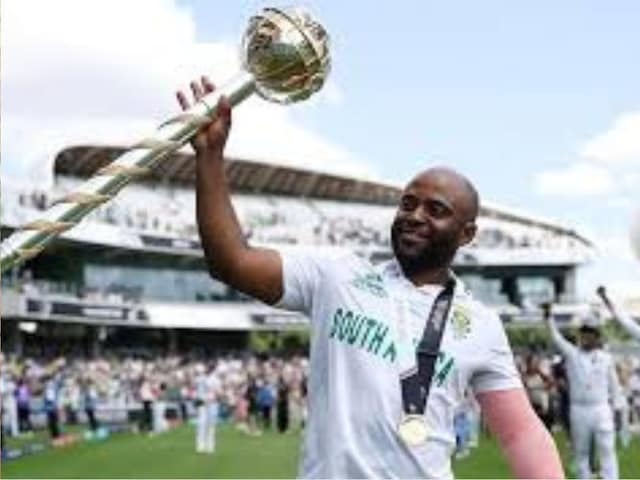Last updated:
Temba Bavuma Story: South Africa’s first black captain Temba Bavuma, South Africa’s first black cricket captain, created history by winning the World Test Championship. Facing racism, he cobbles his …Read more

Temba Bavuma created history by winning the World Test Championship.
Highlights
- Temba Bavuma became the first black cricket captain of South Africa
- Bavuma proved his ability by facing racism
- South Africa won the World Test Championship under Bavuma’s captaincy
Tamba bavuma story: The country’s first black cricket captain Temba Bavuma has created such a history that the children of South Africa will be told their story in the coming days. The name of Temba Bavuma means ‘Asha’ in his native language Khosa. No one else but a prophet must have suggested such a suitable name for this superhero of 5 feet 4 inch cricket. Temba Bavuma’s first major ICC Trophy is very important for the country struggling with the most inhuman practice like apartheid. On the fourth ball of the 84th over under the blue sky on the grounds of Lords, Kyle Varin made a run by driving Mitchell Starc’s ball from point and cover which made South Africa the world Test champion. South Africa defeated defending champions Australia by five wickets by achieving a target of 282 runs.
South African black players like Temba Bavuma have faced a lot of discrimination due to apartheid. This is not limited to them only. Many black players were denied opportunities in cricket due to their color in era of apartheid and even after that. Or their performance was questioned. The struggle of Temba Bavuma is an example of what kind of discrimination has been faced by black players even after the end of apartheid. Bavuma has often been seen as a ‘quota player’. Which means that he has been selected on the basis of his breed instead of his merit. This notion puts unnecessary pressure on their performance and reduces their achievements.

Temba Bavuma with World Test Championship mace.
The performance of black players is always closely monitored and they have to face more criticism than white players. Despite scoring a century as the only black African batsman in Temba Bavuma’s early career, he was labeled to be a ‘quota player’. Recently, Temba Bavuma was ignored twice in the auction of SA 20 (South Africa’s major T20 League). Which raised the question whether it was due to racial bias than his performance. As the first black African captain of South Africa, Temba Bavuma has been under heavy pressure not only on the cricket ground, but also for social representation. Players like Bavuma often have to struggle more than others to prove their ability.
The ambitions of young cricketers raised in Lenga will also touch the sky by winning the title in the most difficult format of Cricket of Temba Bavuma. Langa Cape Town has a black settlement, where Temba Bavuma was raised. Not long ago it was a settlement where there were no basic facilities. In 1990, Nelson Mandela’s release from prison and then in 1994 after the multi-velvety election changed. This place with clay huts with a matchbox is now adorned with tall buildings. Most of whose balconies have satellite discs. Lenga has not forgotten her past, but has definitely moved forward. The Sharpavilla Genocide Memorial is at the same place where in 1960, 69 black anti -protests were killed by police bullets.
Temba Bavuma proved that black cricketers do not adopt this game only to bowl white players. Bavuma showed that black players can also bat. He is the first black cricketer to score a Test century for South Africa. He also won his first major ICC title. Two other black cricketers Cagiso Rabada and Lungi Angidi also performed brilliantly in the final of the World Test Championship. Rabada took nine wickets in both innings. Lungi Angidi worked to bring South Africa back into the game by taking a bang bowling (three wickets) in the second innings. Indian -origin left -arm spinner Keshav Maharaj also took a wicket. White cricketers also performed brilliantly in the finals, such as Edan Marmome, Seam-Balling All-rounder Marco Jenson, David Bedingham and Kyle Varin. This victory increased the stature of Temba Bavuma. He proved that the end of this story could not be better than this.
Ryuns separated cricket in South Africa on racial basis. Black players did not get the same facilities, training and opportunities as white players. It was almost impossible for him to play in the national team, no matter how talented they were. Basil D’Olivera is one of the most famous examples of discrimination in cricket due to apartheid. A major political and sports controversy arose over the inclusion of D’Olivera from the Cape Colored community in the English team for England’s tour of South Africa in 1968–69. He was stopped from playing in the white Test team of South Africa on a racial basis. He had to leave South Africa to play for England. Even though the apartheid was formally terminated, its impact remained on cricket for a long time. Black players were still seen as ‘quota players’ or ‘politically selection compulsion’. Which affected his performance and mental health.
The quota system in Southern African cricket is a system that has been implemented to bring racial equality after long history of apartheid in the country and to ensure the participation of black players in cricket. In South Africa, there was a policy of apartheid for a long time, under which black people were discriminated against. It also affected cricket, where only white players used to get a chance. Due to this policy, South Africa was also banned for 21 years from international cricket, which was removed in 1991. The main objective of the quota system is to ensure proper representation of all racial groups, especially black and black players of African origin in South Africa’s cricket teams. According to the 2016 policy, it is mandatory for any match in the national team to be at least six black players in the playing XI. Of these six black players, at least two players should be blacks of African origin. This rule applies to both national and provincial levels.
The fight continues even today
Makhaya Antini, the first black African Test cricketer of South Africa and the third highest wicket -taker, was also rejected as a ‘quota player’ at the beginning of his career. He faced additional pressure to prove his ability. Similarly, another legendary batsman Hashim Amla was also seen as a compulsion for selection at the beginning of his career. While he used to make a place in the team with his talent and continuous performance. Herschelle Gibbs was an explosive opener who won many matches with his talent. However, he too faced some issues within the team in the post -apartheid era. All these players made their mark in the cricket world with their talent and hard work. But the black shadow of apartheid created many obstacles in his way. Temba Bavuma is still continuing this fight. Providing that talent and leadership has nothing to do with color.


